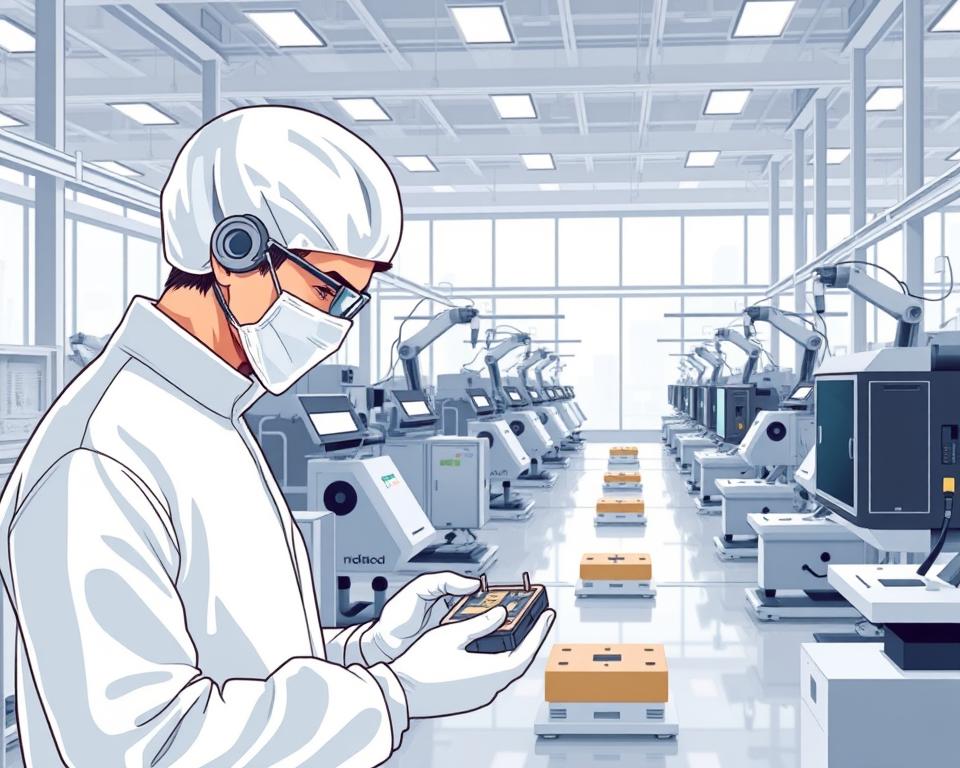Medical Device OEM Contract Manufacturing in Singapore by AMT.
Today, 60% of medical device firms rely on outsourcing to satisfy growing demand and speed up product launches. This trend has unlocked growth in the Asia-Pacific. In this context, AMT Singapore acts as a specialized OEM medical device manufacturer. Developers can expand AMT – OEM contract manufacturing medical devices operations quickly while staying compliant.
AMT operates as a leading OEM medical device manufacturer and partner for Singapore’s original equipment makers, R&D units, and procurement experts. With a global market forecast to hit $595–625 billion in coming years, outsourcing production is not just an option—it’s essential for competing at scale.
AMT’s expertise covers precision injection molding, integration of PCBA and electronics, cleanroom assembly, quick prototyping, and robust regulatory compliance. These include ISO 9001, ISO 13485, and 21 CFR Part 820. Below we outline AMT’s model in a landscape that includes Jabil, Flex, and Sanmina, and we highlight AMT’s regional specialization.
Key Takeaways
- AMT Singapore delivers end-to-end OEM contract manufacturing medical devices by AMT for companies in Singapore and the Asia-Pacific.
- Growing global demand and market size render outsourcing to an OEM medical device manufacturer a defensible move.
- AMT blends precision manufacturing, PCBA, cleanroom assembly, and rapid prototyping to enable product scale-up.
- Regulatory compliance and quality systems align with ISO 13485 and 21 CFR Part 820 requirements.
- AMT stacks up with global contract manufacturers by focusing on specialist OEM services and APAC responsiveness.

Singapore Medtech: Why OEM Contract Manufacturing Counts
In Singapore, the medtech sector is expanding quickly. Firms are under pressure to move products from lab to clinic quickly while ensuring quality. To manage growth without heavy capex, outsourcing production is a effective choice.
The push for market growth demands specialized skills and capacity to scale production. With global medtech expansion, there is increased need for components such as PCBA, molded housings, and fluidics. An accelerated pace of innovation—especially in cardiovascular and diabetes care—adds complexity. OEMs therefore partner with contract manufacturers to access advanced production capabilities.
Outsourcing enables manufacturers to achieve precision without massive capital expenditure. Rather than investing in costly equipment and facilities, they work with contract manufacturers that run validated processes—reducing time-to-market and speeding regulatory approvals.
For Singapore-based OEMs, advantages include faster turnaround and regional support. Local contract manufacturers simplify logistics for ASEAN and APAC markets and support regulatory documentation for efficient market entry and compliance. OEM contract manufacturing medical devices by AMT can significantly simplify these processes via expert management.
Effective cost control and procurement expertise help minimize expenses. Contract manufacturers streamline tooling, sourcing, and supplier relationships to gain scale advantages—delivering more predictable, lower-risk rollouts so Singapore OEMs can focus on high-quality production without overextending resources.
Scalability and risk management are key. Outsourcing supports the journey from prototyping to full-scale production with validation at each step. Quality control, traceability, and compliance lower regulatory and supply-chain risks, aiding global expansion. Collaborating with reputable CMs empowers Singapore OEMs to grow operations safely and sustainably.
OEM contract manufacturing medical devices by AMT
AMT functions as a comprehensive partner for clients needing an OEM medical device manufacturer—covering design collaboration, rapid prototyping, tooling, and material sourcing, then moving into PCBA, injection molding, and cleanroom assembly.
AMT’s Positioning as OEM/CM
AMT excels at full assembly contracts and turnkey production, enabling clients to focus on research, sales, and post-market support while outsourcing validation and commercialization.
AMT’s services are expandable, supporting both prototype volumes and mass production—benefiting startups and established medical entities alike.
Certifications and regulatory compliance
AMT upholds ISO 9001 and ISO 13485 standards, meeting regulatory and purchaser expectations for medical device manufacturing.
Facilities comply with 21 CFR Part 820, supporting FDA-aligned documentation, including device history records and traceability for Class I–III devices.
ISO-class cleanroom manufacturing and sterilization-ready processes minimize contamination risks, helping ensure product safety through scale-up and commercialization.
| Capability | Benefit | Standard |
|---|---|---|
| End-to-end assembly | Simplified ownership across launch and scale | ISO 13485 + 21 CFR 820 |
| PCBA build | Stable electronics builds with DFM | DHR & traceability |
| Injection molding for medtech | Tight-tolerance parts at volume | Validated process + traceability |
| Clean assembly & sterile-ready flows | Controlled bioburden for sensitive builds | ISO cleanrooms + validated sterility |
| Regulatory file support | Submission-ready documentation | Device history records, quality assurance practices |
AMT’s Core Capabilities & Production Solutions
AMT leverages specialized equipment and meticulous process controls to craft scalable, reliable production solutions for Singapore and the region. Materials alignment, validation protocols, and operator training are tuned to each device’s needs while keeping unit costs competitive.
AMT specializes in precision injection molding for high-volume parts—housings, brackets, and connectors requiring sterilization. The workflow includes tooling design, mold fabrication, and precision molding to produce tight-tolerance, biocompatible parts.
Injection molding is key to repeatability and cost reduction at scale. AMT’s tooling capabilities include multi-cavity tools and insert molding, important for overmolded features that fit neatly into automated assembly lines.
AMT’s electronics workstreams cater to PCBA medical devices with DFM support and component sourcing—covering both SMT and through-hole—meeting medical industry expectations.
Validation for PCBA medical devices encompasses rigorous inspection and traceability: test fixtures, in-circuit testing, and burn-in cycles to ensure reliability for monitoring, telehealth, and therapy applications.
For cleanroom assembly, AMT maintains ISO-class environments, managing particulates and microbes. Processes include catheter assembly and handling sensitive electromechanical subassemblies, with contamination risks mitigated throughout final integration.
AMT’s product integration services span electromechanical assembly, final functional testing, packaging, and pre-sterilization prep. With device history records, serialized traceability, and detailed work instructions, they strengthen compliance and continuous optimization.
This capability suite creates a complete, customized pathway that aligns molded components, PCBA devices, and cleanroom assembly—accelerating scale-up timelines to meet client requirements.
Process Development and Rapid Prototyping
AMT pairs engineering expertise with practical process development to move device makers from idea to production efficiently. Early feedback reduces risk and speeds validation—keeping development on schedule for Singapore and nearby markets.
DFM Collaboration & NPI
AMT collaborates with client design teams to streamline assemblies, reduce part counts, and enhance serviceability—making devices easier to manufacture and scale.
NPI support covers engineering reviews, tooling design, and process flow development. AMT defines work instructions and operator training to guarantee consistent outcomes and reduce costly redesigns.
Prototyping to scale: validation and transfer
Rapid prototyping allows functional testing prior to full tooling. AMT runs iterative prototypes to refine materials, tolerances, and layouts—shortening development time and confirming feasibility early.
When prototypes meet targets, AMT moves into structured transfer: process validation (including IQ/OQ/PQ as needed), pilot runs, and detailed planning—securing a smooth transition from clinical to commercial production.
Efficient project management supports staged transfers, minimizing interruptions and aligning regulatory documentation with growth.
Quality, Regulatory & Risk Mitigation
AMT prioritizes safety and compliance throughout production—integrating procedures, training, and electronic oversight to minimize defects and speed regulatory progress for Singapore and global markets.
QMS & Traceability
Aligned with ISO 13485 contract manufacturing and ISO 9001, AMT’s QMS covers document control, supplier assessment, incoming inspection, and corrective actions. eDHR and mandatory process routing ensure lot control to meet device traceability requirements.
Standardized work and operator training enable consistent quality. Lean and Six Sigma improve efficiency and keep competitive pricing. Supplier evaluations and material checks ensure end-to-end traceability.
FDA-Ready Support
AMT supports regulatory documents and maintains validation evidence to facilitate audits and approvals. Operations comply with 21 CFR Part 820 for applicable devices, with meticulous records across Class I–III. Internal audit readiness and expert coordination assist clients during inspections and market entry.
| Area | AMT Practice | Outcome |
|---|---|---|
| Quality Standards | ISO 13485 contract manufacturing and ISO 9001 alignment | Audit efficiency; market readiness |
| Tracking | Serialized and lot-based tracking | Quicker RCAs; recall control |
| Controls | Defined routes; standard tasks | Lower defect rates |
| Regulatory Docs | FDA-aligned doc sets | Stronger inspection outcomes |
| Audit Readiness | Internal + supplier audits | Lower compliance risk and faster approvals |
Supply chain resilience and sourcing advantages with AMT
AMT strengthens supply chain resilience by combining local procurement with a curated global network—keeping optimized inventory and access to medical-grade components for diverse assemblies. Such a method limits single-source dependence and delivers predictable lead times across Singapore and neighboring markets.
A dedicated team focuses on material sourcing and BOM cost management. Through supplier qualification, vendor audits, and alternate sourcing, AMT upholds quality for critical components. Refined BOMs and consolidated buys lower total landed cost for OEMs.
Cost-Focused Sourcing
AMT applies design-for-cost inputs, standardized parts, and waste-reducing process improvements to ensure competitive unit pricing. Consolidated contracts and negotiated freight lower overheads—improving predictability and cost-efficiency.
Scalable Capacity
AMT delivers scalable manufacturing via adaptable capacity planning—BTO, build-to-stock, and configure-to-order models—providing OEMs inventory optimization and faster response to demand changes with full traceability.
Prototype-to-mass production transitions are smoothed by validated protocols and pilot runs. Tiered CM practices keep quality and compliance during ramp, supporting reliability for rapid market access.
| Issue | How AMT Responds | Benefit |
|---|---|---|
| Single-source supply risk | Audit + dual sourcing | Reduced disruptions |
| Rising component costs | Strategic BOM + buys | Lower total landed cost and predictable margins |
| Fluctuating demand | Flexible models + planning | Fewer stockouts |
| Ramp risk | Pilots + validated transfers | Smoother ramp |
Case Studies & Success Stories
AMT is recognized for emergency builds and complex product transfers. Collaborations with OEMs and care teams yield tangible results—turning prototypes into dependable production lines for hospitals and distributors.
A telehealth ventilator program showcases AMT’s Tier-2 role: sourcing, injection-molded parts, PCBA, and final assembly for infectious-disease wards—requiring quick validation, sterile-ready components, and strict lot traceability.
Working closely with the OEM, AMT fulfilled functional and regulatory requirements. Thanks to stringent quality control and scalable capacity, AMT kept up with rising hospital demand—delivering a predictable, auditable production process.
From clinical trials to commercial release, AMT shows strong NPI and transition expertise—pilot runs and rigorous validation scaling devices from small batches to volume in line with ISO 1345 and FDA guidance.
OEMs see reduced lead times, lower investment, and transparent cost structures—underscoring why many medical device case studies select AMT to reduce production risk and speed market entry.
These programs lay a foundation for future cooperation—engineered solutions, complete regulatory documentation, and consistent processes that enable long-term product success.
What’s Next and How AMT Prepares
In Singapore, medtech growth is driven by telehealth, remote diagnostics, and chronic-disease solutions. An aging population and miniaturized, tech-forward products push outsourcing toward skilled CMs—highlighting the value of all-inclusive development partners.
Outlook & Growth Areas
Cardiovascular and orthopedic devices are set for significant growth. Telehealth and point-of-care diagnostics boost production of components and finished goods. Manufacturers that scale quickly and navigate regulations are in high demand.
OEMs will seek strategic CM relationships akin to CDMOs—favoring partners that pair end-to-end development with robust supply chain management.
Advanced Manufacturing & Digitalization
Industry 4.0 is set to reshape plants via automation, robotics, and advanced systems—driving higher efficiency and consistency. Digital tools like Electronic Device History Records enhance product safety and audit performance.
Supply-chain digitalization improves forecasting and QA—creating efficient, risk-mitigated distribution. CMs that modernize excel in delivery speed and regulatory adherence.
| Trend | Effect | AMT Offer |
|---|---|---|
| Telehealth & POC diagnostics | Higher volumes of small, electronics-rich devices; faster time to market | PCBA + cleanroom + rapid scale |
| Automation & Robotics | Better tracking; fewer defects | MES-ready processes, machine vision, automation-ready cells |
| Supply-chain digitalization | Agile sourcing & cost visibility | Integrated sourcing strategies, digital inventory and forecasting |
| Regulatory evidence demands | Higher documentation loads | Validation packages + eDHR |
| Single-partner preference | One-partner programs | Turnkey medical device development services, DFM and NPI support |
AMT has ramped up capability with advanced machinery, cleanrooms, and PCBA lines, poised to incorporate automation and sophisticated quality systems—placing AMT at the forefront of complex device production and compliance.
The Bottom Line
The global medical device market is growing fast, pushing Singapore OEMs toward specialist partners. By outsourcing, they lower initial investment and get to market faster. AMT specializes in oem contract manufacturing for medical devices—covering precision injection molding to cleanroom assembly.
AMT supports its offering with strong quality systems and regulatory adherence—reducing compliance risk. Solid sourcing strategies and adaptable capacity lower supply-chain disruption risk. For teams seeking a contract manufacturing partner, AMT is a credible choice—pairing detailed traceability, proven processes, and case results such as the telehealth ventilator initiative.
For developers moving from prototype to mass production, the right partner is critical. Beyond certifications, look for deep engineering expertise and scalable production capability. Choosing AMT for contract manufacturing can materially lower capital costs, accelerate development, and increase the likelihood of successful market entry in Singapore and beyond.

